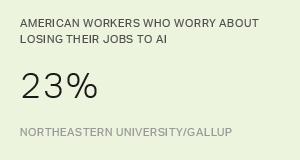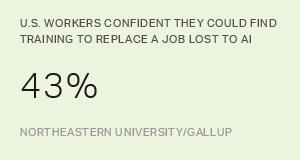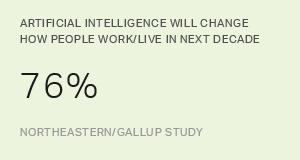Story Highlights
- 48% of Americans support a universal basic income program
- 46% of supporters would pay higher personal taxes to support it
- 80% of supporters say companies should pay higher taxes to fund the program
WASHINGTON, D.C. -- Americans are split in their support for a hypothetical universal basic income (UBI) program that would guarantee a minimum income for workers who lose their jobs because of advances in artificial intelligence (AI). Forty-eight percent support and 52% oppose a UBI program for workers who are displaced by technology.
| Support | Do not support | |||||||||||||||||||||||||||||||||||||||||||||||||||||||||||||||||||||||||||||||||||||||||||||||||||
|---|---|---|---|---|---|---|---|---|---|---|---|---|---|---|---|---|---|---|---|---|---|---|---|---|---|---|---|---|---|---|---|---|---|---|---|---|---|---|---|---|---|---|---|---|---|---|---|---|---|---|---|---|---|---|---|---|---|---|---|---|---|---|---|---|---|---|---|---|---|---|---|---|---|---|---|---|---|---|---|---|---|---|---|---|---|---|---|---|---|---|---|---|---|---|---|---|---|---|---|---|
| % | % | |||||||||||||||||||||||||||||||||||||||||||||||||||||||||||||||||||||||||||||||||||||||||||||||||||
| All Americans | 48 | 52 | ||||||||||||||||||||||||||||||||||||||||||||||||||||||||||||||||||||||||||||||||||||||||||||||||||
| Gender | ||||||||||||||||||||||||||||||||||||||||||||||||||||||||||||||||||||||||||||||||||||||||||||||||||||
| Men | 43 | 57 | ||||||||||||||||||||||||||||||||||||||||||||||||||||||||||||||||||||||||||||||||||||||||||||||||||
| Women | 52 | 48 | ||||||||||||||||||||||||||||||||||||||||||||||||||||||||||||||||||||||||||||||||||||||||||||||||||
| Age | ||||||||||||||||||||||||||||||||||||||||||||||||||||||||||||||||||||||||||||||||||||||||||||||||||||
| 18 to 35 | 54 | 46 | ||||||||||||||||||||||||||||||||||||||||||||||||||||||||||||||||||||||||||||||||||||||||||||||||||
| 36 to 50 | 50 | 50 | ||||||||||||||||||||||||||||||||||||||||||||||||||||||||||||||||||||||||||||||||||||||||||||||||||
| 51 to 65 | 46 | 54 | ||||||||||||||||||||||||||||||||||||||||||||||||||||||||||||||||||||||||||||||||||||||||||||||||||
| 66+ | 38 | 62 | ||||||||||||||||||||||||||||||||||||||||||||||||||||||||||||||||||||||||||||||||||||||||||||||||||
| Education | ||||||||||||||||||||||||||||||||||||||||||||||||||||||||||||||||||||||||||||||||||||||||||||||||||||
| Less than a bachelor's degree | 51 | 49 | ||||||||||||||||||||||||||||||||||||||||||||||||||||||||||||||||||||||||||||||||||||||||||||||||||
| Bachelor's degree or higher | 42 | 58 | ||||||||||||||||||||||||||||||||||||||||||||||||||||||||||||||||||||||||||||||||||||||||||||||||||
| Political party affiliation | ||||||||||||||||||||||||||||||||||||||||||||||||||||||||||||||||||||||||||||||||||||||||||||||||||||
| Republican | 28 | 72 | ||||||||||||||||||||||||||||||||||||||||||||||||||||||||||||||||||||||||||||||||||||||||||||||||||
| Independent | 48 | 52 | ||||||||||||||||||||||||||||||||||||||||||||||||||||||||||||||||||||||||||||||||||||||||||||||||||
| Democrat | 65 | 35 | ||||||||||||||||||||||||||||||||||||||||||||||||||||||||||||||||||||||||||||||||||||||||||||||||||
| NORTHEASTERN UNIVERSITY/GALLUP SURVEY, SEPT. 15-OCT. 10, 2017 | ||||||||||||||||||||||||||||||||||||||||||||||||||||||||||||||||||||||||||||||||||||||||||||||||||||
These data come from a Northeastern University/║┌┴¤═° survey of Americans' attitudes toward AI and its effect on their lives and work. The mail survey of 3,297 U.S. adults was conducted Sept. 15-Oct. 10, 2017. The report found 73% of Americans predicting that AI will lead to a loss of more jobs than it creates.
Under a UBI program more generally, the federal government would provide every adult below a certain income threshold with a specific amount of money each year. A UBI program is often talked about as a potential offset to the disruption likely to occur after new technology is adopted. Several high-profile business leaders, including Richard Branson and Mark Zuckerberg, have publicly discussed this idea. Limited test programs of the idea have occurred in Finland and Canada. A trial program is also planned for San Francisco.
Some U.S. demographic groups are more supportive of the concept than others. More than six in 10 self-described Democrats (65%), as one example, say they would support a UBI program, compared with slightly more than one in four (28%) Republicans.
Additionally, roughly half of most U.S. adult age groups express support. However, support is substantially lower -- 38% -- among Americans aged 66 and older.
Americans' Attitudes on Funding a UBI
While the exact cost of a UBI program in the U.S. depends on the specific details, it is estimated the program could run into the trillions of dollars. U.S. adults who favor a UBI program show mixed support for the idea of financing this type of program through taxes: 46% say they would be willing to pay higher personal taxes to fund the program and 54% say they would not be.
| Yes | No | |||||||||||||||||||||||||||||||||||||||||||||||||||||||||||||||||||||||||||||||||||||||||||||||||||
|---|---|---|---|---|---|---|---|---|---|---|---|---|---|---|---|---|---|---|---|---|---|---|---|---|---|---|---|---|---|---|---|---|---|---|---|---|---|---|---|---|---|---|---|---|---|---|---|---|---|---|---|---|---|---|---|---|---|---|---|---|---|---|---|---|---|---|---|---|---|---|---|---|---|---|---|---|---|---|---|---|---|---|---|---|---|---|---|---|---|---|---|---|---|---|---|---|---|---|---|---|
| % | % | |||||||||||||||||||||||||||||||||||||||||||||||||||||||||||||||||||||||||||||||||||||||||||||||||||
| Overall | 46 | 54 | ||||||||||||||||||||||||||||||||||||||||||||||||||||||||||||||||||||||||||||||||||||||||||||||||||
| Gender | ||||||||||||||||||||||||||||||||||||||||||||||||||||||||||||||||||||||||||||||||||||||||||||||||||||
| Men | 49 | 51 | ||||||||||||||||||||||||||||||||||||||||||||||||||||||||||||||||||||||||||||||||||||||||||||||||||
| Women | 43 | 57 | ||||||||||||||||||||||||||||||||||||||||||||||||||||||||||||||||||||||||||||||||||||||||||||||||||
| Age | ||||||||||||||||||||||||||||||||||||||||||||||||||||||||||||||||||||||||||||||||||||||||||||||||||||
| 18 to 35 | 52 | 48 | ||||||||||||||||||||||||||||||||||||||||||||||||||||||||||||||||||||||||||||||||||||||||||||||||||
| 36 to 50 | 42 | 58 | ||||||||||||||||||||||||||||||||||||||||||||||||||||||||||||||||||||||||||||||||||||||||||||||||||
| 51 to 65 | 40 | 60 | ||||||||||||||||||||||||||||||||||||||||||||||||||||||||||||||||||||||||||||||||||||||||||||||||||
| 66+ | 49 | 51 | ||||||||||||||||||||||||||||||||||||||||||||||||||||||||||||||||||||||||||||||||||||||||||||||||||
| Education | ||||||||||||||||||||||||||||||||||||||||||||||||||||||||||||||||||||||||||||||||||||||||||||||||||||
| Less than a bachelor's degree | 38 | 62 | ||||||||||||||||||||||||||||||||||||||||||||||||||||||||||||||||||||||||||||||||||||||||||||||||||
| Bachelor's degree or higher | 64 | 36 | ||||||||||||||||||||||||||||||||||||||||||||||||||||||||||||||||||||||||||||||||||||||||||||||||||
| Political party affiliation | ||||||||||||||||||||||||||||||||||||||||||||||||||||||||||||||||||||||||||||||||||||||||||||||||||||
| Republican | 29 | 71 | ||||||||||||||||||||||||||||||||||||||||||||||||||||||||||||||||||||||||||||||||||||||||||||||||||
| Independent | 40 | 60 | ||||||||||||||||||||||||||||||||||||||||||||||||||||||||||||||||||||||||||||||||||||||||||||||||||
| Democrat | 55 | 45 | ||||||||||||||||||||||||||||||||||||||||||||||||||||||||||||||||||||||||||||||||||||||||||||||||||
| * Among Americans who support a UBI program | ||||||||||||||||||||||||||||||||||||||||||||||||||||||||||||||||||||||||||||||||||||||||||||||||||||
| NORTHEASTERN UNIVERSITY/GALLUP SURVEY, SEPT. 15-OCT. 10, 2017 | ||||||||||||||||||||||||||||||||||||||||||||||||||||||||||||||||||||||||||||||||||||||||||||||||||||
While support for increased personal taxes to fund a UBI program is mixed, the vast majority of supporters favor taxing the companies that benefit most from AI to fund the program. Eight in 10 supporters of a UBI program (80%) agree that these companies should pay more in taxes in support of such a policy. Support for higher taxes on these companies is at or above 74% among supporters of a UBI program in most demographic groups.
| Agree (5, 4) | Disagree (2, 1) | |||||||||||||||||||||||||||||||||||||||||||||||||||||||||||||||||||||||||||||||||||||||||||||||||||
|---|---|---|---|---|---|---|---|---|---|---|---|---|---|---|---|---|---|---|---|---|---|---|---|---|---|---|---|---|---|---|---|---|---|---|---|---|---|---|---|---|---|---|---|---|---|---|---|---|---|---|---|---|---|---|---|---|---|---|---|---|---|---|---|---|---|---|---|---|---|---|---|---|---|---|---|---|---|---|---|---|---|---|---|---|---|---|---|---|---|---|---|---|---|---|---|---|---|---|---|---|
| % | % | |||||||||||||||||||||||||||||||||||||||||||||||||||||||||||||||||||||||||||||||||||||||||||||||||||
| Overall | 80 | 9 | ||||||||||||||||||||||||||||||||||||||||||||||||||||||||||||||||||||||||||||||||||||||||||||||||||
| Gender | ||||||||||||||||||||||||||||||||||||||||||||||||||||||||||||||||||||||||||||||||||||||||||||||||||||
| Men | 78 | 13 | ||||||||||||||||||||||||||||||||||||||||||||||||||||||||||||||||||||||||||||||||||||||||||||||||||
| Women | 82 | 7 | ||||||||||||||||||||||||||||||||||||||||||||||||||||||||||||||||||||||||||||||||||||||||||||||||||
| Age | ||||||||||||||||||||||||||||||||||||||||||||||||||||||||||||||||||||||||||||||||||||||||||||||||||||
| 18 to 35 | 83 | 8 | ||||||||||||||||||||||||||||||||||||||||||||||||||||||||||||||||||||||||||||||||||||||||||||||||||
| 36 to 50 | 77 | 9 | ||||||||||||||||||||||||||||||||||||||||||||||||||||||||||||||||||||||||||||||||||||||||||||||||||
| 51 to 65 | 84 | 7 | ||||||||||||||||||||||||||||||||||||||||||||||||||||||||||||||||||||||||||||||||||||||||||||||||||
| 66+ | 77 | 11 | ||||||||||||||||||||||||||||||||||||||||||||||||||||||||||||||||||||||||||||||||||||||||||||||||||
| Education | ||||||||||||||||||||||||||||||||||||||||||||||||||||||||||||||||||||||||||||||||||||||||||||||||||||
| Less than a bachelor's degree | 80 | 9 | ||||||||||||||||||||||||||||||||||||||||||||||||||||||||||||||||||||||||||||||||||||||||||||||||||
| Bachelor's degree or higher | 80 | 10 | ||||||||||||||||||||||||||||||||||||||||||||||||||||||||||||||||||||||||||||||||||||||||||||||||||
| Political party affiliation | ||||||||||||||||||||||||||||||||||||||||||||||||||||||||||||||||||||||||||||||||||||||||||||||||||||
| Republican | 74 | 14 | ||||||||||||||||||||||||||||||||||||||||||||||||||||||||||||||||||||||||||||||||||||||||||||||||||
| Independent | 75 | 13 | ||||||||||||||||||||||||||||||||||||||||||||||||||||||||||||||||||||||||||||||||||||||||||||||||||
| Democrat | 88 | 5 | ||||||||||||||||||||||||||||||||||||||||||||||||||||||||||||||||||||||||||||||||||||||||||||||||||
| * Among Americans who support a UBI program | ||||||||||||||||||||||||||||||||||||||||||||||||||||||||||||||||||||||||||||||||||||||||||||||||||||
| NORTHEASTERN UNIVERSITY/GALLUP SURVEY, SEPT. 15-OCT. 10, 2017 | ||||||||||||||||||||||||||||||||||||||||||||||||||||||||||||||||||||||||||||||||||||||||||||||||||||
Implications
Estimates indicate that as many as 47% of all U.S. jobs are at risk of replacement by AI, and most Americans agree that the adoption of this new technology will create fewer jobs than it makes obsolete. Additionally, half of American workers (51%) say they would need additional education or training to find an equivalent job if they lost their current position to new technology, though fewer -- 43% -- are confident they could secure this education. This potentially sets up a situation in which adopting AI will result in significant unemployment and disruption.
Americans are mixed on their support for the idea of a universal basic income program, which has been advanced by some high-profile proponents, including Elon Musk, to help ease the pain of the AI revolution. Americans' mixed levels of support for a UBI program for those who lose their jobs to AI may be related to the finding that most don't personally fear losing their jobs to the new technology.
Read the full Northeastern University/║┌┴¤═° report "Optimism and Anxiety: Views on the Impact of Artificial Intelligence and Higher Education's Response."
Survey Methods
Results for the Northeastern University-║┌┴¤═° survey on artificial intelligence are based on surveys conducted by mail from Sept. 15-Oct. 10, 2017, with a random sample of 3,297 U.S. adults aged 18 and older. The survey package included an English and a Spanish survey to provide respondents with the flexibility to reply in their preferred language.
║┌┴¤═° selected the sample of U.S. residents using address-based sampling (ABS), a sampling technique used to select households from a list of all households on file with the United States Postal Service (USPS). ║┌┴¤═° chooses respondents within the household at random based on which household member would have the next birthday. ║┌┴¤═° used a series of postcard reminders to encourage participation in the survey.
║┌┴¤═° weighted the data to match national demographics of gender, age, education, race, Hispanic ethnicity, education and region.
All reported margins of sampling error include the computed design effects for weighting.
For results based on the total sample of 3,297 U.S. adults, the margin of sampling error is ┬▒2 percentage points at the 95% confidence level.





